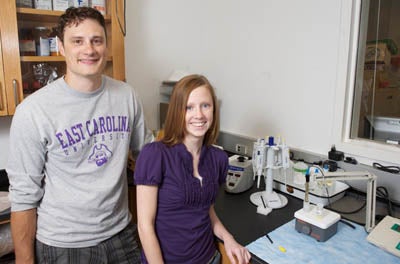Grant funds research opportunity for ECU senior
GREENVILLE, N.C. — An East Carolina University senior will have the chance to pursue a lifelong goal while gaining valuable research experience thanks to a grant awarded by the North Carolina Biotechnology Center.
Jennifer Satterwhite and her faculty mentor, Eli Hvastkovs, assistant professor of analytical chemistry at ECU, received an Undergraduate Research Fellowship Award from the center’s Education and Training Program last month.

Jennifer Satterwhite and her chemistry faculty mentor, Eli Hvastkovs, received a grant from the North Carolina Biotechnology Center. Photo by Cliff Hollis.
The one-year, $5,000 grant – one of 15 awarded to North Carolina universities – will fund their project titled, “Development of a Sequence Specific Electrochemical Genotoxicity Sensor.”
For Satterwhite, a native of Hickory, it’s an opportunity to study a topic that has interested her since childhood. The chemistry major chose her field after seeing family members deal with diseases including cancer.
“I studied chemistry because I wanted to help find a cure for cancer or another disease affecting people. That is the dream – to cure something. Ever since I was a little girl, I’ve always wanted to do this,” she said.
Now, with grant funding, Satterwhite will dedicate more than 400 hours to investigating a new way to detect cancer.
The project expands on earlier research by Hvastkovs. “What we’re trying to do is develop a sensor to test certain gene sequences to see if they would be prone to carcinogenic damage,” Hvastkovs said.
Typically, he said, scientists analyze large stretches of DNA to determine whether a dangerous molecule will change the proteins permanently, which can cause cancer. This project hopes to provide evidence of a faster and cheaper way to get the same results.
“We want to try to take little segments of DNA that we think could be reactive and important to cancer pathways, put them on the sensor, expose them to dangerous metabolites and see if we can detect the DNA damage that is happening,” Hvastkovs said.
The process is done electrochemically, using electricity to analyze the changes in the DNA molecule.
Satterwhite, who hopes to pursue a master’s degree in chemistry after graduating from ECU, said she appreciates the opportunity to participate in real-world scientific research while learning more about the field of biotechnology.
She had to brush up on her biology knowledge before beginning the experiment. “I had to do a lot of research on DNA. It’s a really interesting topic, but very complicated,” Satterwhite said.
She and Hvastkovs will work this summer to compile data for the project. Research will continue in the fall. As part of the grant, Satterwhite is also required to deliver a seminar on her research at ECU, present a paper or poster at a professional conference and attend a state meeting on the business aspects of biotechnology.
The opportunities provided by this grant will be beneficial to Satterwhite as she pursues a career in chemistry, Hvastkovs said. “She is going to have a lot of good experience on her resume,” he said.